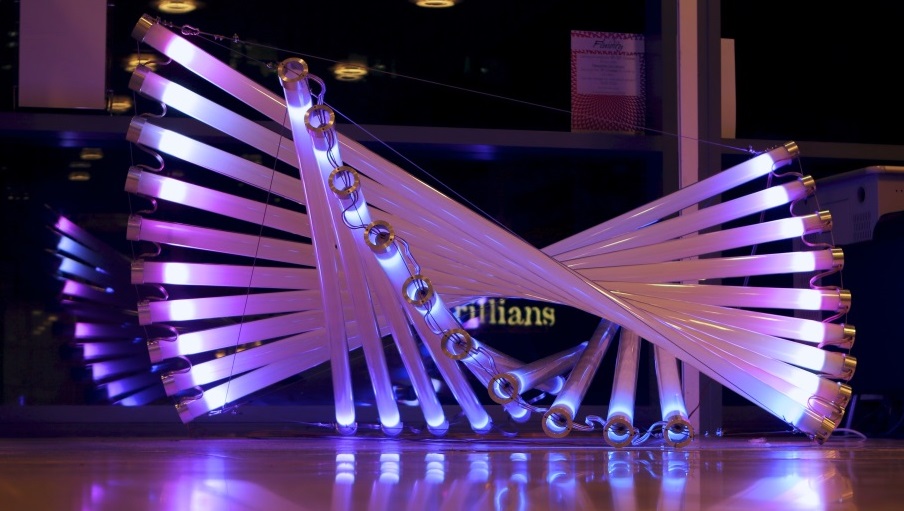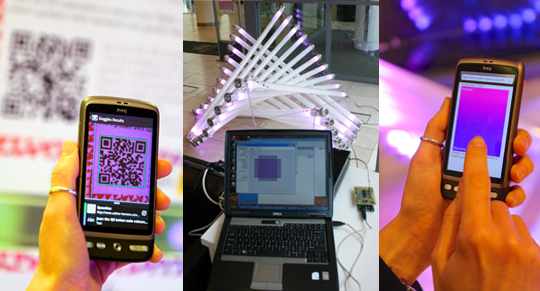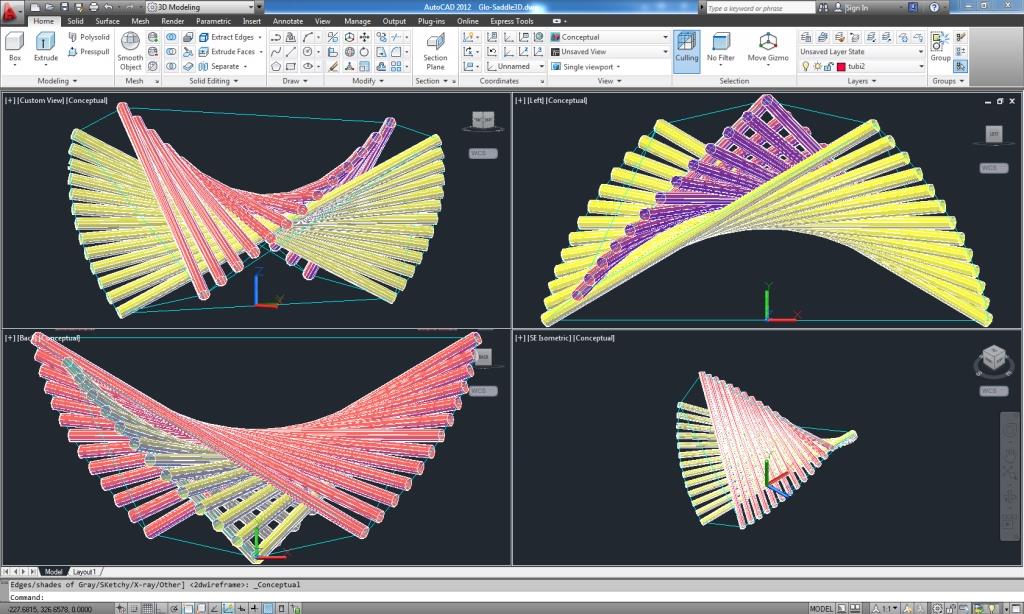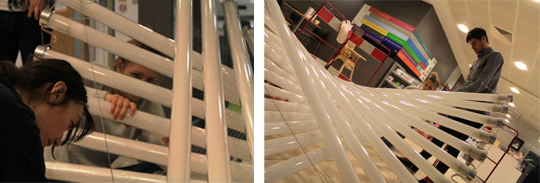FLUIDITY: BEYOND BINARY
Aether & Hemera has taken part in the Northern Design Festival 10 - 20 October 2013, with a new project called 'Fluidity' complemented by Dr Hilton's talk 'Can we change our mind about gender'. Supported using public funding by Arts Council England.
This project results from the collaboration between Gloria Ronchi, founder of Aether & Hemera, and Dr. Kevin Hilton, Reader in Designing for Transformational Experiences, Northumbria University. Dr. Hilton is researching into gender diversity and inclusion, with the aim of using design to help people accept and understand humankind's diversity of gender experiences and needs.
Keywords: Art and science collaboration, gender identity, interactive light installation, real-time data representation, audience engagement, gender fluidity, xDesign #critical #media #aesthetics #abstract #code #interactive #new media #new media art
Fluidity is an interactive lighting installation which visualises the 'gender experiences' of the festival audience. This lighting work reacts in real time reflecting people’s feelings, changing its colour according to the data inputted by the participants through their smart phones.

Influenced by Dr. Hilton’s research and supported by his deep insight, Aether & Hemera's art installation aims at stimulating discussion and reflection around gender identity, engaging with people and helping them question pre-assumptions.
The perception of gender has long been experienced through the binary concept of male and female, but categorical models have recently been challenged and researchers have started asking whether spectral ranges are more appropriate and more inclusive. Dr Hilton’s study explores current gender perceptions and how they may change.
The main idea is that while some people are 'gender static', others are 'gender fluid' and their gender experience varies over time and in different contexts. Based on this background and inspired by these theories, the installation will consist of dynamic lighting scenarios that reflect the engagement of the audience, with lights that change colour spectrally/chromatically proportional to their entries.

Using a chromatic range for visualising the gender experience between the polar labels of 'Feminine' and 'Masculine', we hope to open up new opportunities for discussion around gender identities and experience; furthermore, individuals will be able to interact with the system from different 'entry environments' exploring the correlation between the places, their emotional responses and gendered perceptions, gaining insight of their own individuality, including gender stasis and fluidity.
We have pondered various options before arriving at the decision of using pink and blue as the two extreme colours of the chromatic scale; we have discussed this very stereotypical use of colours and it is interesting noticing that in the United States, pink and blue colour norms for baby clothes did not take root until the 1920. In fact at that time some people even argued that pink was a strong manly colour and was more appropriate for boys.

A series of QR codes are displayed at different Festival locations, allowing users with a smart phone to quickly start interacting with the artwork. The interaction revolves around gender experiences expressed on a chromatic scale in association with each particular place and moment in time from different 'entry environments'.
We are interested in how media and data, interact with space and place through new forms of participation and engagement. Bespoke software modulates individual RGB LED lights for creating a spectacular and lively scenography based on this interactions; the artwork behaviour is entirely based on the involvement of the public thus embodying interaction and encouraging social participation. The control system includes an Arduino, bespoke DMX circuitry and software to allow people to interact with the artwork by scanning the QR code and connecting their mobile phone to the Fluidity webpage.
QR codes can be founded at the following locations: Northumbria University, MakerSpace, the Toffee Factory.
'Fluidity' by Aether & Hemera from Aether & Hemera on Vimeo.
The design
The creation of a tangible 3D installation connected to a digital network, will embody the complex network of relationships connecting gender and places as well as rise questions on how 'virtual' performances of sexuality become materialized in digital and physical spaces; Fluidity interactive lighting installation will constitute an opportunity for the audience to engage and explore these subjects at personal, emotional and political levels.

We worked on the concept of tensegrity* for expressing the complex dynamics of gender perception and identity; components in compression inside a net of continuous tension creates an harmonic fluid and a continuous structure that reflects abstractly different approaches towards building politics of gender self-determination in a world defined by rigid perceptions of gender as categorically binary: man/woman.

We have used perspex tubes as isolated components in compression inside a net of continuous tension, made of stainless steel cables, for delineating the system spatially.
Aims
In society with a growing equality and inclusion of gender and gender behaviours, there is a possible argument for social order which suggests relation to one another as people, not following the oppositional sexism of categorising them as simply men and women. It is by research and dissemination such as this that our literacy and comprehension will increase our capacity to include and engage.
Northern Design Festival 2013 - Can we change our mind about gender? from Design at Northumbria on Vimeo.
Departing from the binary logic of gender representation, we hope to open up new opportunities for discussion around identities as well as the complex network of relationships connecting gender and spaces. Our aim is to use experimental design and explore the opportunity that new technologies present for social change.
References
Fuller, R. Buckminster; Marks, Robert (1973 ),The Dymaxion World of Buckminster Fuller, Garden City, New York: Anchor Books.
Hilton, Kevin (2011), Inclusive designing with gender fluidity. In: Include 2011: Sixth International conference on Inclusive Design, 18-20 April 2011, Royal College of Art, London, UK
Irigaray, L., Trans. (1995), This Sex Which is Not One. New York: Cornell University Press.
Jo B. Paoletti (1987), Clothing and Geneder in America: Children’s Fashions, 1890-1920, Signs 13:1,136-43.
Copyright
The article on this page is copyright of Gloria Ronchi (aka Aether & Hemera) and cannot be reproduced or reused in any form totally or partially without our written consent.
Find by timeline:
2025
December
January
2024
March
January
2023
December
November
September
2022
December
November
July
June
2021
December
October
September
February
2020
November
October
2019
December
November
January
2018
December
November
October
June
March
2017
December
November
October
September
August
June
April
March
February
2016
November
September
July
June
April
January
2015
November
October
August
March
2014
December
October
September
August
July
June
May
March
January
2013
September
July
May
April
February
January
2012
December
October
September
August
July
June
May
April
March
February
January
2011
December
March
January
2010
December
October
September
June
May
Find by tag:
, activation, art, Art_and_science, art_festival, art_nstallation, Art_trail, Arte, Arte_e_Tecnologia, artista_della_luce, artisti, artists_studio, artists_talk, artivism, Audio Video Interaction, boats, Campaigns, code_art, conetemporary_art, Connect2, creative_software, designing_lights, digital_art, Events, exhibition, Exhibitions, floating_art, floating_installation, flotilla, Gloria, Gloria_Ronchi, hope, immersive_art, Installation, interaction_design, interactive, interactive_installation, interactive_public_art_installation, led, light, light_artwork, light_festival, light_installation, lightart, lighting, Links, lit, london, luce, luci, luci_artista, lumiere, media_architecture, media_art, open_studio, OpenSource, origami, origami_boats, paper_boats, Proposals, public, Public_art, public_sculptures, scultura_di_luce, software_art, studio_d_artista, water, winternights
Private:
Login

